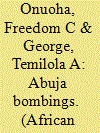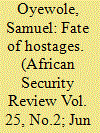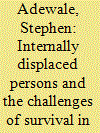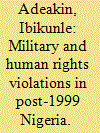|
|
|
Sort Order |
|
|
|
Items / Page
|
|
|
|
|
|
|
| Srl | Item |
| 1 |
ID:
144703


|
|
|
|
|
| Summary/Abstract |
Since his inauguration on 29 May 2015, President Muhammadu Buhari has taken several practical, policy and diplomatic actions aimed at defeating the six-year long insurgency by Boko Haram terrorists in Nigeria. These actions have started to have a modest positive impact on reclaiming the territories previously held by the terrorists. Boko Haram has reacted by ramping up its attacks on soft targets and communities in the north-east. This article focuses on Boko Haram's bombing activities in Nigeria's capital city, Abuja. It shows that between 2011 and 2015, Boko Haram has staged nine bombings in Abuja, resulting in the deaths of at least 191 people, including suicide bombers. It argues that the October 2015 suicide bombings in Kuje and Nyanya, Abuja, represent Boko Haram's bold attempt to respond to President Buhari's counter-insurgency efforts. The article proposes the ‘five Ds’ approach as part of robust measures for combating the insurgency.
|
|
|
|
|
|
|
|
|
|
|
|
|
|
|
|
| 2 |
ID:
144700


|
|
|
|
|
| Summary/Abstract |
This article examines the failure of the Nigerian government to exercise its responsibility to protect (R2P) populations from mass atrocities in the wake of Boko Haram's violent and persistent attacks against civilians in north-east Nigeria. After the abduction of 276 schoolgirls on 14 April 2014, the affected communities engaged directly in protecting their villages and families. Another murderous and devastating attack on Baga in January 2015 and the abduction of over 400 women in Damasak in March 2015 continued to expose the governmental failure to protect people at risk of losing their lives. This article examines the dynamics of the people's response to the crisis and investigates whether this response could be conceptually defined as a ‘fourth pillar’ of R2P, when a state – even in collaboration with the international community – is unable to live up to its R2P. Certainly, such a phantom ‘fourth pillar’ is symbolic and should not be used in any way by governments to re-delegate their first pillar primary R2P.
|
|
|
|
|
|
|
|
|
|
|
|
|
|
|
|
| 3 |
ID:
144697


|
|
|
|
|
| Summary/Abstract |
Does the reference to regional hegemony in the African context apply to Nigeria? This study examines this question in line with increasing claims in academic and diplomatic circles of Nigerian hegemony in Africa. While scholars and leading opinion holders have described Nigeria's influence in Africa as typical of a regional hegemon, this paper interrogates the substance of this argument in the context of the nature of the country's foreign policy relations in Africa. Against this background, the article contends that Nigeria actually enjoys a dwindling influence in Africa notwithstanding its current status as Africa's largest economy. The article argues that although Nigeria has never officially harboured any hegemonic aspirations, this hardly disqualifies it from being Africa's hegemonic power. It takes the position that Nigeria remains an important regional power on the continent but is hindered by several factors in playing a hegemonic role. In making this assertion, the article considers a number of conditions that increasingly deflate Nigeria's capacity to play a meaningful hegemonic role in Africa. In doing this, it critically assesses the inherent internal and constraining external conditions that diminish Nigeria's claims to or credentials for effective regional hegemony.
|
|
|
|
|
|
|
|
|
|
|
|
|
|
|
|
| 4 |
ID:
144702


|
|
|
|
|
| Summary/Abstract |
The violence against hostages in Nigeria's armed conflicts is alarming. Killings, physical mutilation, sexual abuse, forced marriage, religious persecution, forced labour and conscription of hostages have all been recorded during Nigeria's conflicts in recent times. This trend has increased the concern for the fate of hostages in the country. However, there have been a few exceptions: some have escaped from their abductors, while a few others have been released for ransom or rescued by security operatives. This study examines the fate of hostages captured in Nigeria's conflict theatres, namely the Niger Delta region and the northern region of the country. The study seeks to understand the variations in the fates of hostages, their survival strategies, and the efficacy of Nigeria's crisis management approaches in the aforementioned conflict theatres.
|
|
|
|
|
|
|
|
|
|
|
|
|
|
|
|
| 5 |
ID:
144701


|
|
|
|
|
| Summary/Abstract |
Nigeria is facing a series of interconnected economic and humanitarian crises which, if not resolved, will disrupt basic life-support systems, contribute to the worsening of already fragmented security structures and perpetuate underdevelopment and indebtedness. Following the dispersal of the inhabitants of north-eastern Nigeria by Boko Haram, accessing adequate food, shelter and safe drinking water is becoming increasingly difficult for the majority of the dispersed population. This article examines contemporary discourse on the plight of the internally displaced persons (IDPs) living in Abuja, Nigeria. It reveals that there is agreement among a range of citizens on the need for the Nigerian government to change its policy orientation in dealings with IDPs. The article argues that there is considerable neglect of IDPs and highlights the security implications of such policies on the city of Abuja.
|
|
|
|
|
|
|
|
|
|
|
|
|
|
|
|
| 6 |
ID:
144698


|
|
|
|
|
| Summary/Abstract |
Nigeria is currently faced with a series of internal security challenges that threaten the very existence of the country. In the areas where conflict has erupted, the military has been consistently accused of violating human rights during its operations. The aim of this article is to explore the claims of human rights abuses levelled against the military and assess the prospect of an effective internal enforcement mechanism. The study that forms the basis of this article involved interviews with 18 high-ranking serving and retired military officers. The empirical results suggest that there are four main areas that need to be strengthened to limit the alleged cases of human rights violations.
|
|
|
|
|
|
|
|
|
|
|
|
|
|
|
|
| 7 |
ID:
144699


|
|
|
|
|
| Summary/Abstract |
This article attempts to explain the apparent failure of Nigeria's military action against the Boko Haram (roughly translated as ‘Western education is prohibited’) insurgency in the north-east of the country. Until the involvement of troops from Chad and Niger in January 2015, the Boko Haram insurgents were succeeding in their effort to establish, or rather consolidate, an extreme version of the ‘Islamic state’ in parts of north-east Nigeria. For over five years, the military struggled to defend the sovereignty and territorial integrity of Nigeria against Boko Haram, with little success. The war opened a Pandora's box, exposing a deep crisis in the military and the civilian leadership in Nigeria. The Boko Haram insurgents were able to fly the flag of their ‘state’ in the territory of Nigeria. This article argues that the failure of the military action can be attributed to three factors: the erosion of military professionalism under civilian administrations since 1999; the poor handling of the war by the top military officers; and a lack of decisiveness in the leadership of President Jonathan and the military to end the insurgency.
|
|
|
|
|
|
|
|
|
|
|
|
|
|
|
|
|
|
|
|
|